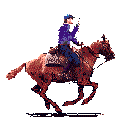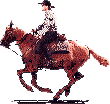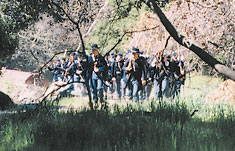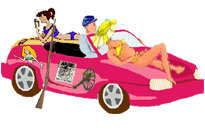OFF TO THE CIVIL WAR
THE SEARCH FOR JOHN WESLEY HARGRAVE
OF WILDER'S LIGHTNING BRIGADE
(A Mid-life Crisis Adventure and Travel Essay)
PART ONE: REVEILLE
MY LIFE AS A CIVIL WAR SOLDIER
 At the start of the climb men had been singing patriotic marching songs. That music didn't last. Spare breath, even for basic conversation, had been quickly exhausted, and each time the men looked up, the crest of the ridge seemed no nearer than before. As the column halted for rest I dropped by the side of the road, my knapsack pulling me over on my back like some upended tortoise. I didn't care. I lay there prone, sucking air, concentrating on recovery, wondering again what I'd been thinking when I decided to take part in this somewhat insane excursion. Yes, there I was, a month away from my forty-second birthday, dressed in hot wool, prostrate in the dirt. And for this experience I'd left my wife and kids, and a comfortable La-Z-Boy recliner.
At the start of the climb men had been singing patriotic marching songs. That music didn't last. Spare breath, even for basic conversation, had been quickly exhausted, and each time the men looked up, the crest of the ridge seemed no nearer than before. As the column halted for rest I dropped by the side of the road, my knapsack pulling me over on my back like some upended tortoise. I didn't care. I lay there prone, sucking air, concentrating on recovery, wondering again what I'd been thinking when I decided to take part in this somewhat insane excursion. Yes, there I was, a month away from my forty-second birthday, dressed in hot wool, prostrate in the dirt. And for this experience I'd left my wife and kids, and a comfortable La-Z-Boy recliner.
 Civil War reenactors called this type of event a "Tactical." We were to spend two days attempting to recreate, to relive, to the extent possible, the lives of Civil War soldiers. It was to be two days of deprivation and dirt, two days of imagining we were Union soldier on campaign. It was a weekend of pretending, or wishing, perhaps, that we were twenty years old again.
Civil War reenactors called this type of event a "Tactical." We were to spend two days attempting to recreate, to relive, to the extent possible, the lives of Civil War soldiers. It was to be two days of deprivation and dirt, two days of imagining we were Union soldier on campaign. It was a weekend of pretending, or wishing, perhaps, that we were twenty years old again.
 Around me, in various states of collapse, other middle age men were recovering. Some were down on hands and knees in the middle of the road, others looked on the verge of heart attacks. "And this is a hobby!" I thought, as the fellow next to me vomited large chunks of his undigested breakfast onto the dusty road. Perhaps hobby wasn't the right word -- more of an addiction, really.
Around me, in various states of collapse, other middle age men were recovering. Some were down on hands and knees in the middle of the road, others looked on the verge of heart attacks. "And this is a hobby!" I thought, as the fellow next to me vomited large chunks of his undigested breakfast onto the dusty road. Perhaps hobby wasn't the right word -- more of an addiction, really.
 Once over the ridge our situation improved. For the balance of the weekend we guarded roads and picketed streams, or stormed about firing our muskets at Confederate reenactors hidden behind rocks and trees. They fired back at us (blank rounds, of course, one could only hope). Grazing cows looked on passively as men charged past through the pastures, up one hill and down another, shouting and yelling, occasionally stopping in mid conflict to wipe cowpies from their feet or to argue over who had been shot and who hadn't.
Once over the ridge our situation improved. For the balance of the weekend we guarded roads and picketed streams, or stormed about firing our muskets at Confederate reenactors hidden behind rocks and trees. They fired back at us (blank rounds, of course, one could only hope). Grazing cows looked on passively as men charged past through the pastures, up one hill and down another, shouting and yelling, occasionally stopping in mid conflict to wipe cowpies from their feet or to argue over who had been shot and who hadn't.
 By early afternoon the Rebels were threatening to pack up and go home. The men in gray had apparently come to a consensus that the Union wasn't taking its share of the casualties. After a tense parley between officers the dispute was resolved and shooting resumed. Breathing a sigh of relief I sat down for lunch.
By early afternoon the Rebels were threatening to pack up and go home. The men in gray had apparently come to a consensus that the Union wasn't taking its share of the casualties. After a tense parley between officers the dispute was resolved and shooting resumed. Breathing a sigh of relief I sat down for lunch.
 Meals consisted of Civil War hardtack (inch thick biscuits with the permeability of roofing shingles), raw carrots, shelled peanuts, old cheese and something called salt pork (really just large chunks of heavily salted pig fat). On a forty-degree night we slept fully clothed, shivering under too few blankets, on the side of a hill abundantly mined with manure. I left that event, as I frequently did, thinking it would be my last.
Meals consisted of Civil War hardtack (inch thick biscuits with the permeability of roofing shingles), raw carrots, shelled peanuts, old cheese and something called salt pork (really just large chunks of heavily salted pig fat). On a forty-degree night we slept fully clothed, shivering under too few blankets, on the side of a hill abundantly mined with manure. I left that event, as I frequently did, thinking it would be my last.
 That tactical had been in April. Over time memory of the weekend would synthesize into something more pleasant. The doubts and uncertainty I often felt when attending these events always seemed to fade, eventually, into more sublime images of heroic soldiers, waving banners and grand adventure.
That tactical had been in April. Over time memory of the weekend would synthesize into something more pleasant. The doubts and uncertainty I often felt when attending these events always seemed to fade, eventually, into more sublime images of heroic soldiers, waving banners and grand adventure.
 If my interest in the Civil War was lifelong, reenacting was a fairly new activity. I wasn't sure what had finally persuaded me to "don the wool" as I liked to call it. There were certainly times I would speculate on the matter, though, and wonder if it wasn't somehow related to turning forty. And inevitably, there were those inconsiderate individuals who observed me in my "Yankee blues," and carelessly bantered about phrases that included the words mid-life crisis.
If my interest in the Civil War was lifelong, reenacting was a fairly new activity. I wasn't sure what had finally persuaded me to "don the wool" as I liked to call it. There were certainly times I would speculate on the matter, though, and wonder if it wasn't somehow related to turning forty. And inevitably, there were those inconsiderate individuals who observed me in my "Yankee blues," and carelessly bantered about phrases that included the words mid-life crisis.
 I didn't like the sound of that, but I could ignore such shallow critique reasoning that I displayed none of the classic characteristics of any mid-life male dementia. I wasn't losing my hair, yet; I wasn't gaining weight, really. And I wasn't driving around in a red convertible sports car with bikini clad young women. All I had done, was to suit up in scratchy wool, attached to my head an unusual blue cap, and marched off to
I didn't like the sound of that, but I could ignore such shallow critique reasoning that I displayed none of the classic characteristics of any mid-life male dementia. I wasn't losing my hair, yet; I wasn't gaining weight, really. And I wasn't driving around in a red convertible sports car with bikini clad young women. All I had done, was to suit up in scratchy wool, attached to my head an unusual blue cap, and marched off to
the sound of mock battle. It seemed fairly normal to me. Anyway, irrespective of the original causes for my behavior, there I was, gear and everything, an official bonafide Civil War reenactor. Or from another perspective, my wife's actually: "a grown man who ran off to play war every few months."
 A large national reenactment commemorating the 1863 Civil War battle of Chickamauga had been organized for September. It was to be held just south of Chattanooga, Tennessee in north Georgia. Ten thousand reencators were expected to converge for the weekend event. It was clearly marked on my calendar. I planned to be there.
A large national reenactment commemorating the 1863 Civil War battle of Chickamauga had been organized for September. It was to be held just south of Chattanooga, Tennessee in north Georgia. Ten thousand reencators were expected to converge for the weekend event. It was clearly marked on my calendar. I planned to be there.
 At Chickamauga I was to be part of a group of Southern California reenactors. There were more than 300 of us headed for Dixie. We would portray a Civil War regiment of Norwegian immigrant farmers, the 15th Wisconsin Volunteer Infantry. These Scandinavians fought at Chickamauga. They had spoken virtually no English. To assist in our portrayal of these men we'd been issued language primers with Norwegian military commands and phrases. I'd managed to learn but one line: "Ikke skyt meg," It meant "Don't shoot me!" Of all the utterances in the manual I thought it potentially the most useful.
At Chickamauga I was to be part of a group of Southern California reenactors. There were more than 300 of us headed for Dixie. We would portray a Civil War regiment of Norwegian immigrant farmers, the 15th Wisconsin Volunteer Infantry. These Scandinavians fought at Chickamauga. They had spoken virtually no English. To assist in our portrayal of these men we'd been issued language primers with Norwegian military commands and phrases. I'd managed to learn but one line: "Ikke skyt meg," It meant "Don't shoot me!" Of all the utterances in the manual I thought it potentially the most useful.
 The reenactment wasn't the entirety of my trip. In conjunction with the marching and shooting I was planning six days of Civil War touring with my oldest friend, Scott, a fellow Civil War addict/nut. We'd grown up as nextdoor neighbors in a Chicago suburb. From the age of two Scott and I had become inseparable. We were fairly typical boys growing up, I guess, except for this Civil War thing, a fascination which had a firm grip on us before we were ten.
The reenactment wasn't the entirety of my trip. In conjunction with the marching and shooting I was planning six days of Civil War touring with my oldest friend, Scott, a fellow Civil War addict/nut. We'd grown up as nextdoor neighbors in a Chicago suburb. From the age of two Scott and I had become inseparable. We were fairly typical boys growing up, I guess, except for this Civil War thing, a fascination which had a firm grip on us before we were ten.
 In the fifth grade we were already attempting to bring the Civil War to the world, creating extensive battle murals on the bulletin boards of Mrs. Melzer's classroom. When we'd finished, soldiers in blue and gray were fighting and dying from one end of the room to the other. I always supported Abe Lincoln and the Union. Scott, on the other hand, was always the misguided Rebel. As far as I knew he still was.
In the fifth grade we were already attempting to bring the Civil War to the world, creating extensive battle murals on the bulletin boards of Mrs. Melzer's classroom. When we'd finished, soldiers in blue and gray were fighting and dying from one end of the room to the other. I always supported Abe Lincoln and the Union. Scott, on the other hand, was always the misguided Rebel. As far as I knew he still was.
 Scott and I were to meet in Nashville. I was flying in; he was to drive down from Louisville where he lived with his wife and two children. Our plan was to tour south retracing the Union Army's march through Tennessee in 1863. We'd stop at Civil War sites with peculiar names like Stones River and Hoover's Gap, Tunnel Hill and Leet's Tanyard. Then, arriving south of Chattanooga for the big battle we'd spend a long weekend in a vast recreated Civil War army camp -- a sort of reenactors' paradise.
Scott and I were to meet in Nashville. I was flying in; he was to drive down from Louisville where he lived with his wife and two children. Our plan was to tour south retracing the Union Army's march through Tennessee in 1863. We'd stop at Civil War sites with peculiar names like Stones River and Hoover's Gap, Tunnel Hill and Leet's Tanyard. Then, arriving south of Chattanooga for the big battle we'd spend a long weekend in a vast recreated Civil War army camp -- a sort of reenactors' paradise.
 For three days there would be no bathing or grooming. We'd live among thousands of other mildly disturbed, foul smelling men in soiled wool, sprouting greasy tangled Bozo hair. At five in the morning drums would roll and bugles sound reveille. Men would throw off dirty, sodden, blankets and fall into line. And then ten thousand reenactors would recreate a sort of carnage free depiction of the battle of Chickamauga. Spectators would gape and point, hold their ears (and possibly their noses) and shoot video of the grand spectacle.
For three days there would be no bathing or grooming. We'd live among thousands of other mildly disturbed, foul smelling men in soiled wool, sprouting greasy tangled Bozo hair. At five in the morning drums would roll and bugles sound reveille. Men would throw off dirty, sodden, blankets and fall into line. And then ten thousand reenactors would recreate a sort of carnage free depiction of the battle of Chickamauga. Spectators would gape and point, hold their ears (and possibly their noses) and shoot video of the grand spectacle.
 When the Chickamauga event was over, we'd pack our gear, tell our comrades good-bye, and then, perhaps, head south again, toward Atlanta, following Sherman and his offensives in the summer of 1864. Or we might turn west instead, toward the Grant campaigns at Shiloh and Vicksburg. It really didn't matter which way we finally decided to travel. The Civil War, real and imagined, would be all around us.
When the Chickamauga event was over, we'd pack our gear, tell our comrades good-bye, and then, perhaps, head south again, toward Atlanta, following Sherman and his offensives in the summer of 1864. Or we might turn west instead, toward the Grant campaigns at Shiloh and Vicksburg. It really didn't matter which way we finally decided to travel. The Civil War, real and imagined, would be all around us.
 For more than a hundred years the Civil War had been America's epic tale. For all my life it had been mine. In a sense, I suppose, it was our Trojan War. Poet and novelist, Robert Penn Warren, in his 1961 essay, The Legacy of the Civil War, described the cataclysm, when viewed from contemporary perspective, as America's "Homeric period." As I contemplated the pending trip, planned stops on this pilgrimage, as I read regimental histories and soldiers' letters, an uncontrollable fever of excitement came over me. I understood all too well the passions of Heinrich Schliemann, the first excavator of Homer's Troy. As Schliemann stood on the mound at Ilios and contemplated Homer's tale of the great champions Hector and Achilles, I knew how he must have felt. I too was drawn to the ground on which my heroes walked.
For more than a hundred years the Civil War had been America's epic tale. For all my life it had been mine. In a sense, I suppose, it was our Trojan War. Poet and novelist, Robert Penn Warren, in his 1961 essay, The Legacy of the Civil War, described the cataclysm, when viewed from contemporary perspective, as America's "Homeric period." As I contemplated the pending trip, planned stops on this pilgrimage, as I read regimental histories and soldiers' letters, an uncontrollable fever of excitement came over me. I understood all too well the passions of Heinrich Schliemann, the first excavator of Homer's Troy. As Schliemann stood on the mound at Ilios and contemplated Homer's tale of the great champions Hector and Achilles, I knew how he must have felt. I too was drawn to the ground on which my heroes walked.
 I would spend weeks pouring over topographical maps of Tennessee and Georgia, pinpointing, hopefully, nearly forgotten places where the soldiers campaigned. And I was the son of a former Presbyterian minister, doing this. I was a young man who grew up during the Vietnam era, doing this. As always I was a bit mystified at such martial interests.
I would spend weeks pouring over topographical maps of Tennessee and Georgia, pinpointing, hopefully, nearly forgotten places where the soldiers campaigned. And I was the son of a former Presbyterian minister, doing this. I was a young man who grew up during the Vietnam era, doing this. As always I was a bit mystified at such martial interests.
 Still, I reminded myself often, that Civil War history, our national collective memory of that horrific period, had become to a large extent, inevitably, romanticized fiction. Robert Penn Warren alluded to the relationship between presumed historical fact and creative narrative. "If poetry is the little myth we make," he wrote, "history is the big myth we live, and in our living, constantly remake."
Still, I reminded myself often, that Civil War history, our national collective memory of that horrific period, had become to a large extent, inevitably, romanticized fiction. Robert Penn Warren alluded to the relationship between presumed historical fact and creative narrative. "If poetry is the little myth we make," he wrote, "history is the big myth we live, and in our living, constantly remake."
 Often, when in the ranks of my reenactment unit, I'd recall Penn Warren's words, and find myself asking whether I was bringing history to life, or mostly contributing to some growing, evolving, Civil War myth? (Penn Warren probably would have said that the two were inseparable.)
Often, when in the ranks of my reenactment unit, I'd recall Penn Warren's words, and find myself asking whether I was bringing history to life, or mostly contributing to some growing, evolving, Civil War myth? (Penn Warren probably would have said that the two were inseparable.)
 As the adventure approached, my wife, always perplexed by my addiction, would stand by watching as I meticulously sorted and organized my Civil War campaign gear: Wool uniform, blankets, musket, bayonet, canteen, haversack, knapsack, leathers -- allergy medicines, sunscreen, bug spray, camera. (Authenticity was to be carried only so far.)
As the adventure approached, my wife, always perplexed by my addiction, would stand by watching as I meticulously sorted and organized my Civil War campaign gear: Wool uniform, blankets, musket, bayonet, canteen, haversack, knapsack, leathers -- allergy medicines, sunscreen, bug spray, camera. (Authenticity was to be carried only so far.)
 On many a night as I'd drift off to sleep the Civil War's siren song came through. I could hear the gunfire and smell the smoke -- and a voice would be calling: "Steady boys...forward on my command...charge!"
On many a night as I'd drift off to sleep the Civil War's siren song came through. I could hear the gunfire and smell the smoke -- and a voice would be calling: "Steady boys...forward on my command...charge!"

 With forty-pound packs and ten pound muskets thirty-four sweaty men in blue wool uniforms trudged up a dusty mountain road. For more than an hour, beneath a hot morning sun, it had been one miserable footfall after another. Up they stumbled, in poor fitting, foot blistering, box toed, Civil War shoes called Brogans that slipped on the loose grade as if the soles were Teflon coated. Perspiration poured in streams down boiling red faces. Legs strained and backs ached.
With forty-pound packs and ten pound muskets thirty-four sweaty men in blue wool uniforms trudged up a dusty mountain road. For more than an hour, beneath a hot morning sun, it had been one miserable footfall after another. Up they stumbled, in poor fitting, foot blistering, box toed, Civil War shoes called Brogans that slipped on the loose grade as if the soles were Teflon coated. Perspiration poured in streams down boiling red faces. Legs strained and backs ached.








